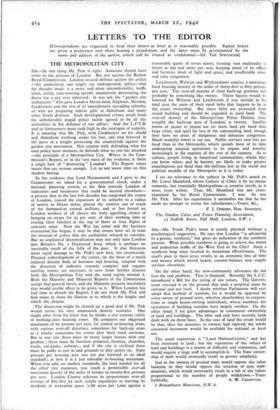SIR,—Mr. Frank Pick's letter is• purely physical without a psychological
suggestion. He says that London " is advancing to a greater synthesis," but gives no indication of the synthetic process. What possible synthesis is going to relieve the motor and pedestrian traffic of the West End or the City? Such a synthesis long since reached its maximum effectiveness. The snail's pace in these areas results in an economic loss of time and money which would largely counter-balance new supply services elsewhere.
On the other hand, the new-community advocates do not face the real problem. That is financial. Recently the L.C.C. introduced a Bill for the rating of site values. The Govern- ment rejected it on the ground that such a proposal must be national and not local. I doubt whether Parliament will ever adopt that method of taxation, for it would be opposed by every owner of ground rents, whether shareholders in corpora- tions or single house-owning individuals, whose numbers the operations of building societies have largely swollen. On the other hand, I see great advantages in communal ownership of land and buildings. The tithe and coal have recently been dealt with on those lines. In the case Of land the result would be that, after the annuities to owners had expired, the whole unearned increment would be available for national or local use.
The usual expression is "Land Nationalisation," and has been restricted to land ; but the separation of the values of land and buildings is a matter of difficulty and contention, and would require a large staff to accomplish it. The State owner- ship of both would eventually result in greater simplicity.
Just as the owners of ground rents would oppose site value taxation, so they would oppose the creation of new com- munities, which would necessarily result in a fall of site values proportional to the number of people withdrawn.—Yours






































 Previous page
Previous page